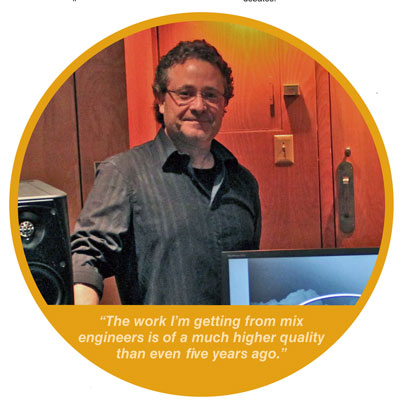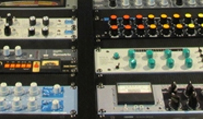BOB VOSGIEN
Company: Capitol Mastering
Clientele: Bob Seger, Sick Puppies, Graffiti6
Contact: [email protected], 323-871-5003
After graduating from Boston’s Berklee School of Music in ‘84 with a degree in audio recording, Bob Vosgien switched coasts and took a job with Capitol Mastering in Hollywood as a production engineer, where he worked under famed mastering engineer Wally Traugott. He took a short breather from Capitol but it’s now been his home since ‘98.
Which mix problems can be addressed in the mastering stage? Which can’t?
We can’t undo a mix that has been overlimited and overcompressed. If I get a mix that’s too hot, too slammed, it’s better for me to take it into my DAW digitally and then deal with it using plug-ins.
What are the new challenges in mastering today?
The work I’m getting from mix engineers is of a much higher quality than even five years ago. It has probably caused other mastering guys to up their game because mixers are giving mastering a shot. I’m still able to beat them but it’s getting a lot closer.
 How closely do you work with mix engineers?
How closely do you work with mix engineers?
A lot of the mixers I work with I’ve known for a long time. They already know the do’s and don’ts. But it’s still useful to have a listen to the mix when it’s in process. It helps the final product.
Do they understand your challenges and try to work with you?
They do. We usually talk about how hot they want it and how much dynamics they want to keep. Sometimes they’ll want it as hot as the last Green Day record. But Green Day is a trio. You can get a sparse mix a lot louder than you can a mix with 10 layers of guitars and vocals. If you try to get your client’s mix that loud, it’ll implode.
What’s the ideal format for mixes that you receive?
96/24, 192/24 and I’m even getting some 32-bit floating point Pro Tools sessions. In fact, I’m doing a lot of 32-bit lately. It helps with the processing of plug-ins and it’s supposed to be more workable headroom, although I haven’t noticed that.
Have you ever mastered a gold CD?
I did a few back in the day for Mobile Fidelity. I don’t know if gold is any better. There’s nothing that I did differently.
Do the online mastering forums offer good information?
It’s a mix of good and bad, but there will always be trolls. I used to have an email notification set up on one of the forums for anytime my name was mentioned. But I find that it’s best to not even get involved in nasty debates.
Are there red flags that show a musician that he might be working with a less than reputable mastering engineer
The biggest red flag is the engineer’s experience. I wouldn’t hire a mastering engineer unless he’d been doing it for at least 10 years. I’m always learning new things because you never want to get too comfortable. This is a very competitive job. Credits mean a lot.
What’s the biggest mastering challenge you’ve ever faced?
No Doubt’s Tragic Kingdom. There were so many reels of half-inch tape and multiple remixes. Spooling tape takes time.
What’s the biggest technical challenge/problem you’ve ever gotten out of?
The American remaster of Meet The Beatles! Those quarter-inch tapes were probably the hottest quarter-inches that I’ve ever come across. They were absolutely slammed. I had to drop the output of my two-track by 6 dB to start.
What do you say to fledgling mastering engineers?
Listen to a lot of good mixes and get plenty of practice. Mastering is challenging and competitive. There are so many well-equipped mastering rooms around the world now. It always comes down to the skill, experience and ears of the engineer.












